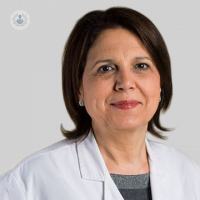Alcohol consumption in pregnant can cause fetal alcohol syndrome
Written by:Fetal Alcohol Syndrome is the set of signs and symptoms that occur as a result of alcohol consumption during pregnancy and that last a lifetime. These symptoms are characterized by a delayed physical and mental development, as well as craniofacial abnormalities. It is the leading cause of preventable birth defects and mental retardation during pregnancy is a serious public health problem.

In the nineteenth century it was associated directly alcohol consumption during pregnancy with malformations in the newborn. Fetal Alcohol Syndrome (FAS) was first described in 1968 as Lemoine. Currently, the term Fetal Alcohol Spectrum (FASD) is used disorder, referring to a set of presentations and disabilities resulting from exposure to alcohol in the womb. This disorder includes Fetal Alcohol Syndrome, Partial Fetal Alcohol Syndrome, neurodevelopmental disorders related to alcohol, neurobehavioral disorder associated with prenatal alcohol exposure and birth defects related to alcohol.
Alcohol is a teratogen with serious effects on the development of various systems, especially in the developing central nervous system.
Alcohol freely crosses the placenta rapidly reaching the fetus. Time elimination of alcohol by the fetus is higher than that of the mother; It is causing more vulnerable. It also acts as a cellular toxic and can cause cell death, alterations in cell growth and / or interference in cell differentiation or other morphogenic processes. All these functions are basic features of cell growth and development of the organism, which affects both the form (congenital malformations) and the (growth, learning and behavioral disorders) function, as well as death embryonic and / or fetal .
Its side effects are more serious especially when consumption occurs during the first trimester of pregnancy, which is the most vulnerable by cell differentiation.
Fetal Alcohol Syndrome: what dose of alcohol is toxic?
Specialists in Pediatrics say that no amount of alcohol consumption during pregnancy can be considered safe. In fact, there is no safe quarter for drinking alcohol. All types of alcohol pose a similar risk and excessive drinking is a dose-related risk to the fetus. Depending on the time of pregnancy and metabolizing mother, moderate or infrequent use of alcohol can also lead to Fetal Alcohol Syndrome.
Prevalence of Fetal Alcohol Syndrome
It is difficult to determine the prevalence of Fetal Alcohol Syndrome as alcohol intake by pregnant is unknown because many children are diagnosed late due to the wide variety of clinical manifestations at birth. However, it is estimated that between 4 and 15% of the children of women who consume large amounts of alcohol during pregnancy suffer from fetal alcohol syndrome.
Clinical manifestations of fetal alcohol spectrum (FASD) disorder are:
- There is a specific pattern of facial abnormalities: short palpebral fissures, thin upper lip and flat philtrum.
- Delay prenatal and postnatal growth. They tend to have lower height and weight, at least until puberty.
- CNS dysfunction. This dysfunction can be physical, such as small head circumference microcephaly), or behavioral, such as attention deficit disorder.
There may also be other clinical manifestations such as strabismus, cardiac abnormalities, skeletal among others.
Fetal Alcohol Syndrome: Treatment
It is very important to early diagnosis and early treatment also start by professionals, offering support to the child, family and school; since these children have certain behaviors that disrupt social relationships, toxic abuse, school performance and mental health, which in many cases causes can not live independently.
The main treatment is based on early intervention programs psychopedagogical treatment, both to help children with self - regulation to support teachers and caregivers in managing behavior at school and at home.
The prevention of this disease is total abstinence from alcohol by the mother. This is the most effective measure.
Edited by Noelia García Pino


